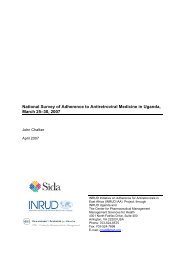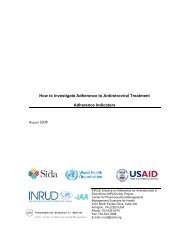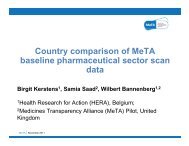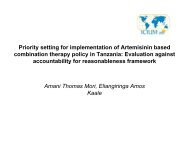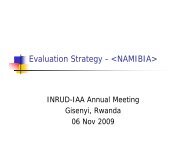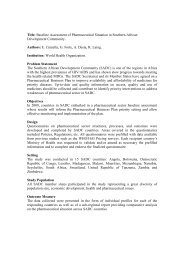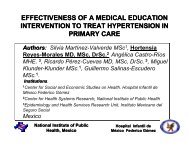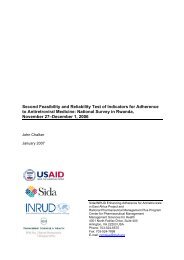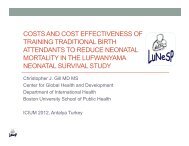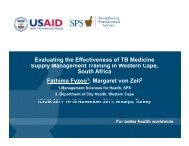How to investigate levels of Adherence to antiretroviral ... - INRUD
How to investigate levels of Adherence to antiretroviral ... - INRUD
How to investigate levels of Adherence to antiretroviral ... - INRUD
You also want an ePaper? Increase the reach of your titles
YUMPU automatically turns print PDFs into web optimized ePapers that Google loves.
<strong>How</strong> <strong>to</strong> Investigate <strong>Adherence</strong> <strong>to</strong> Antiretroviral Treatment:<br />
An Indica<strong>to</strong>r-Based Approach<br />
Days' Supply <strong>of</strong> Medicine Dispensed<br />
11. The average number <strong>of</strong> days' supply <strong>of</strong> ARVs usually given <strong>to</strong> new patients<br />
12. The average number <strong>of</strong> days' supply <strong>of</strong> ARVs usually given <strong>to</strong> experienced patients<br />
Facility Services and Contact with the Community<br />
13. The percentage <strong>of</strong> facilities that provide food for patients<br />
14. The percentage <strong>of</strong> facilities that have a formal system for linking patients with other<br />
persons living with HIV as support partners<br />
15. The percentage <strong>of</strong> facilities that have connection with the local community, such as<br />
churches or other organizations<br />
3. Complementary demographic indica<strong>to</strong>rs<br />
1. Tuberculosis status—Percentage <strong>of</strong> patients with TB comorbidity<br />
2. WHO disease stage at initiation <strong>of</strong> ARVs—Percentage <strong>of</strong> patients diagnosed as stage<br />
I, II, III and IV at initiation<br />
1. Complementary Facility Indica<strong>to</strong>rs<br />
Labora<strong>to</strong>ry tests<br />
CD4 and viral load testing rate:<br />
1. Percentage <strong>of</strong> patients with documented CD4 test results at initiation <strong>of</strong> treatment.<br />
2. Percentage <strong>of</strong> patients with documented CD4 test results in last six months.<br />
3. Percentage <strong>of</strong> patients with documented viral load test in last six months.<br />
Rationale<br />
Source <strong>of</strong> data<br />
Data collection<br />
Computation<br />
Comments<br />
Increase in CD4 count over time is an indirect measure <strong>of</strong> success in<br />
controlling HIV. Routine testing for CD4 can assist in adherence moni<strong>to</strong>ring.<br />
Clinical records.<br />
Based on same sample <strong>of</strong> 100 patients find the clinical records and search for<br />
CD4 count at initiation and most recent CD4 count and viral load.<br />
Initiating CD4 testing rate—(number <strong>of</strong> patients with documented CD4 count<br />
at initiation <strong>of</strong> ART/number <strong>of</strong> patients searched) × 100.<br />
CD4 testing rate—(number <strong>of</strong> patients with documented CD4 count in last 6<br />
months/number <strong>of</strong> patients searched) × 100.<br />
Viral load testing rate—(number <strong>of</strong> patients with documented viral load in last<br />
6 months/number <strong>of</strong> patients searched) × 100.<br />
This will give a much more accurate assessment than the simple questioning<br />
during the facility interview. <strong>How</strong>ever, it does involve finding the clinical<br />
records for the 100 patients. Not all facilities do routine CD4 counts or viral<br />
loads for all patients.<br />
144



